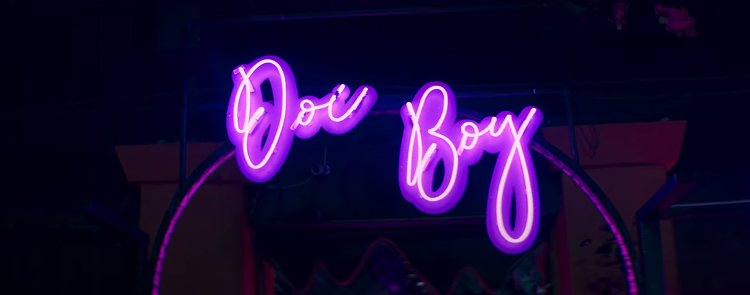
Nontawat Numbenchapol’s film Doi Boy (ดอยบอย) was released on Netflix yesterday. Nontawat’s documentaries — including Boundary (ฟ้าต่ำแผ่นดินสูง), By the River (สายน้ำติดเชื้อ), and Soil Without Land (ดินไร้แดน) — have highlighted sensitive political issues, and Doi Boy, his first feature film, is no exception.
Boundary and Soil Without Land both explored tensions on Thailand’s borders, and in both cases the documentaries focused on the experiences of a young soldier caught up in a larger conflict. Boundary follows Aod, a Thai soldier who returns to his home town on the border with Cambodia. Jai, the main subject of Soil Without Land, is a stateless man living on the border between Myanmar and Thailand, who reluctantly joins the Shan State Army.
Sorn, the central protagonist of Doi Boy, is also a young man from Shan State conscripted into the military. After deserting, he crosses the border into Thailand, jumping from the frying pan into the fire. He is forced to totally transform his identity (from monk to soldier to sex worker) and, like other undocumented migrants in Thailand and elsewhere, he is exploited by almost everyone he meets, but particularly by Ji, a corrupt police officer with a guilty conscience.
Doi Boy begins with young Thai demonstrators chanting “For the people!” Clearly, this is meant to evoke the student protest movement that began in 2020, calling for reform of the monarchy, but the real-life slogans were presumably too sensitive for the film. Nontawat previously made Sound of ‘Din’ Daeng, a series of short documentaries about the demonstrators, and he recreates the atmosphere of the protests in Doi Boy.
Another slogan of the Doi Boy protesters is: “It could be you!”, a reference to the kidnapping and murdering of protest ringleaders. It soon becomes clear that the police are behind these crimes, as Ji suffocates a captured protester, Bhoom, with a bin bag. In 2021, corrupt police chief Thitisan Utthanaphon murdered drug suspect Jeerapong Thanapat in the same manner. That case was also referenced, much less tastefully, in Poj Arnon’s comedy Oh My Ghost! 8 (หอแต๋วแตกแหก โควิดปังปุริเย่).
Boundary and Soil Without Land both explored tensions on Thailand’s borders, and in both cases the documentaries focused on the experiences of a young soldier caught up in a larger conflict. Boundary follows Aod, a Thai soldier who returns to his home town on the border with Cambodia. Jai, the main subject of Soil Without Land, is a stateless man living on the border between Myanmar and Thailand, who reluctantly joins the Shan State Army.
Sorn, the central protagonist of Doi Boy, is also a young man from Shan State conscripted into the military. After deserting, he crosses the border into Thailand, jumping from the frying pan into the fire. He is forced to totally transform his identity (from monk to soldier to sex worker) and, like other undocumented migrants in Thailand and elsewhere, he is exploited by almost everyone he meets, but particularly by Ji, a corrupt police officer with a guilty conscience.
Doi Boy begins with young Thai demonstrators chanting “For the people!” Clearly, this is meant to evoke the student protest movement that began in 2020, calling for reform of the monarchy, but the real-life slogans were presumably too sensitive for the film. Nontawat previously made Sound of ‘Din’ Daeng, a series of short documentaries about the demonstrators, and he recreates the atmosphere of the protests in Doi Boy.
Another slogan of the Doi Boy protesters is: “It could be you!”, a reference to the kidnapping and murdering of protest ringleaders. It soon becomes clear that the police are behind these crimes, as Ji suffocates a captured protester, Bhoom, with a bin bag. In 2021, corrupt police chief Thitisan Utthanaphon murdered drug suspect Jeerapong Thanapat in the same manner. That case was also referenced, much less tastefully, in Poj Arnon’s comedy Oh My Ghost! 8 (หอแต๋วแตกแหก โควิดปังปุริเย่).

At the end of the film, a somewhat ethereal body is shown, in a foetal position, apparently inside an oil drum. Again, this has real-life echoes: several anti-government activists, including Wanchalearm Satsaksit, are missing, presumed dead, and after Porlajee Rakchongcharoen was murdered in 2014, his remains were found in an oil drum. Apichatpong Weerasethakul’s exhibition A Minor History (ประวัติศาสตร์กระจ้อยร่อย) showed the disposal of the bodies of murdered political dissidents in the Mekong river.
Doi Boy admirably addresses human rights abuses in a feature film, though it’s also very stylishly shot and edited. Phuttiphong Aroonpheng attempted a similar combination with Manta Ray (กระเบนราหู), though whereas Phuttiphong’s film was a case of style over substance, Doi Boy achieves exactly the right balance. This is immediately apparent from the audacious opening sequence, when Sorn performs a striptease wearing a rubber gimp suit, intercut with flashbacks to Ji’s suffocation of Bhoom.
Doi Boy admirably addresses human rights abuses in a feature film, though it’s also very stylishly shot and edited. Phuttiphong Aroonpheng attempted a similar combination with Manta Ray (กระเบนราหู), though whereas Phuttiphong’s film was a case of style over substance, Doi Boy achieves exactly the right balance. This is immediately apparent from the audacious opening sequence, when Sorn performs a striptease wearing a rubber gimp suit, intercut with flashbacks to Ji’s suffocation of Bhoom.
